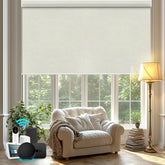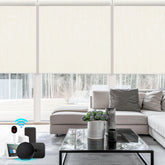Cellular Shades vs Blinds: Best Home Design Ideas for Every Room
The right window treatments can transform the appearance, experience and comfort of your home. Cellular shades vs blinds have unmatched advantages in terms of energy conservation as well as fashion. Knowing what suits your rooms will enable you to make the most effective design and practical decisions.

What Are Cellular Shades?
Also referred to as honeycomb shades, cellular shades are made in a pattern of cells that resemble a honeycomb. This building captures air, and this becomes useful in insulating your house against energy bills.
Types of Cellular Shades:
- Single-cell Basic insulation, low-cost and lightweight.
- Will have double-cell: Double insulation, less heat loss in winter and heat gain in summer.
- Triple-cell: This is the maximum insulation used in very extreme weather or in large windows.
Key Features and Benefits:
- Energy efficient: save up on heating and cooling expenses.
- Diffusion of soft light: The light of the sun is hard and, at the same time, diffuses brightly into a room.
- Privacy: The Top-down/bottom-up type lets light in and at the same time makes your space private.
- Reduction of noise: sound is absorbed thus bedrooms or offices become less noisy.
- Multiplicity of style: It comes in various colors, textures and fabrics.
Cellular shades can suit any homeowner who wishes to have a smooth and contemporary appearance without the loss of functionality. They are especially used in bedrooms, living rooms and offices.
What Are Blinds?

Blinds are a traditional window dressing consisting of wood, metal or vinyl slats. They offer privacy and adjustable lighting by tilting, raising or lowering the slats.
Types of Blinds:
- Venetian blinds: Horizontal slats consisting of wood, fake wood or aluminum.
- Vertical blinds: This is the best fit on big windows or a sliding door.
- Roller blinds: Clean and minimalistic, ideal to fit in a contemporary decor.
- Mini blinds: these are small slats that are small and lightweight.
- Faux wood blinds: Waterproof, for bathroom and kitchen.
Key Features and Benefits:
- Control the light easily with various activities.
- Long-lasting and durable materials.
- Different alternatives that fit all budgets.
- It comes in several types to fit the home decor.
Blinds are effective in spaces that need flexible lighting systems like in the kitchens, bathrooms, and offices as well as complementing either the traditional or modern interiors.
Cellular Shades vs Blinds: Key Differences
The distinction between cellular shades and blinds is that you can know which one to use in the house:

Light Control:
- The shades of a cell are soft diffusing light giving a warm, soft feeling.
- With the use of blinds, the slats can be tilted to provide either full sunlight or full shade.
Privacy:
- Cellular shades provide complete privacy when closed.
- Blinds have variable privacy at the cost of having some gaps between slats.
Energy Efficiency:
- Cellular blinds are used to line windows that make rooms a lot warmer in winter and a lot cooler in summer.
- Blinds do not offer a lot of insulation unless they are covered with curtains.
Maintenance:
- The blinds can be cleaned using a cloth or a duster.
- Cellular shades should be carefully vacuumed or spotted.
Style:
- Shades of cellular: contemporary, minimalistic, smooth.
- Blinds: Classical, multi-purpose, traditional.
The two options should be chosen in accordance with your priorities: the most important ones are energy efficiency and privacy, so cellular shades are the best ones to choose; alternatively, you should use blinds, as they offer better adjustment of the light and more vintage design.
Benefits of Choosing Cellular Shades for Your Home
Cellular shades are not just a style to wear. They come with several functional benefits:
1. Energy Efficiency
This honeycomb structure traps air which serves as insulation. You can also save 20 percent of the heating and cooling fees.
2. Noise Reduction
The layers are soundproofed, ideal for bedrooms, home offices or apartment buildings.
3. Modern Appearance
They are clean and have soft textures, which make them suitable in modern and minimalist houses.
4. Customization
You are free to select the best top-down/bottom up designs, colors, and fabrics to suit your decor.
If a living room is to be decorated with a soft gray shade that is two-celled, top-down, and less glare, this will add sophistication to the home.
5. Pets and children welcome
Several shades are cellular with cordless designs thereby enhancing safety.
The cellular shades apply especially where decor and functionality are of concern, such as in the bedroom and living room.
Benefits of Choosing Blinds for Your Home
Blinds are all-purpose and convenient, and they have several advantages:
1. Adjustable Light
Slats can be tilted or raised to restrict natural light. Fits well in a living room and a home office.
2. Durable Materials
Wood, aluminum and faux wood blinds can be used with minimal attention and last several years.
3. Cost-Effective
Blinds are cheaper than cellular shades in most instances and thus can be used by low-end homeowners.
4. Versatile Styles
The blinds are available in different sizes, colors and finishes to suit any style in the room.
5. Easy Maintenance
Easy to wipe using a damp cloth or dusting or blotting.
Blinds are best suited for functional locations such as kitchens, bathrooms, and offices where you require flexibility in the light as well as durability.
Which Rooms Are Best for Cellular Shades?
- Bedrooms: Full privacy, low light diffusion, and insulation enhance the quality of sleep.
- Living Rooms: Decrease glare and still get a touch of natural light and also add glamour.
- Kitchens Clean fabrics have minor spills and splashes.
- Home Offices Make it look smooth and professional and minimize outward noise.
Extra Tips:
- Apply a shade of 2 or 3 cells to rooms with huge windows or when exposed to a lot of sunlight.
-
Use light colors to make small rooms look larger.

Which Rooms Are Best for Blinds?
- Bathrooms: The faux wood or vinyl blinds are moisture-resistant and do not warp.
- Kitchens Steamed surfaces and food splashes are dealt with on hard, easily accessible surfaces.
- Living Rooms: They should be outfitted with lights that can be adjusted to read, watch television, or host visitors.
- Home Offices: The Blinds offer accurate light control of screen and video calls.
Extra Tips:
- The sliding doors should have vertical blinds.
- Small or slender windows should have mini blinds.
Cellular Shades vs Blinds: Style & Design Considerations
1. Matching Interior Styles
- Cellular shades: The shades are ideal in modern, minimalistic and contemporary rooms.
- Blinds: Suit conventional, rustic or industrial areas.
2. Colors & Textures
- Select the light neutrals to choose a spacious feel.
- Blinds can coordinate with furniture or wall colors.
3. Special Considerations:
Look at the ceiling height, window width, and the size of the room and then make the decision.
Tips for Choosing Between Cellular Shades and Blinds
- Elements of priorities: light control, privacy, and energy efficiency.
- Measure the windows correctly so that they fit.
- Take into account the type of rooms and style of decoration.
- Take into consideration the service and life cycle.
- Plan smart: Cellular shades are more expensive to purchase but more energy efficient, whereas blinds will cost less and will not be as insulating.

Expert Advice: Combining Shades and Blinds
- Benefits of Layering: By combining blinds with cellular shades, the maximum light would be controlled, the maximum insulation and the style would be achieved.
- Combine Materials and Colors: Wooden blinds of light color shades may produce a comfortable, balanced appearance.
- Big Windows: It is an arrangement of treatments that can be utilized to control light and privacy.
Maintenance and Longevity Tips
- Cellular shades: Vacuum clean with the help of a brush addition or clean with a damp cloth in case of small stains. Avoid harsh scrubbing.
- Blinds: Clean the slats of the blinds often and dry them with a wet fabric to avoid accretion. In the case of metal blinds, they are polished occasionally to retain the shine.
Bonus Advice: The regular servicing extends life and makes window treatments appear years younger.
Cost Comparison: Cellular Shades vs Blinds
- Cellular Shades: This will be a higher initial investment but will save on energy expenses in the long run because of energy savings.
- Blinds: cheaper to install but they have lower insulation.
Custom Options: They both can be customized in terms of size, color, or material, which has an impact on the overall price.
Conclusion: Choosing the Right Option for Every Room.
The cellular shades vs blinds have distinct benefits. The option is based on the preferences of light control, privacy, insulation, and style.
We have high-quality window solutions of design, functionality and durability at Bringnox. Visit our collection of cellular shades and blinds and choose the most suitable shade in every room of your house to make it more comfortable and stylish today!
FAQs About Cellular Shades vs Blinds
1. Is cellular better than blinds in insulation?
Yes, cellular shades capture air in their honeycomb structure and are therefore more energy-saving.
2. Can blinds be used in humid areas like bathrooms?
The faux wood and vinyl blinds that resist moisture are great with moisture.
3. Compare cellular shades vs blinds: which one is simpler to clean?
Blinds can be wiped, whereas cellular shades need some delicacy in cleaning with a vacuum or spot cleaning.
4. Can I layer blinds and shades together?
Yes, the layering will provide flexibility in the control of light, privacy, and fashion.
5. How do I choose the right window treatment for each room?
Look at the light, privacy, insulation, fashion and budget. In bedrooms, cellular shades suit better whereas in kitchens and offices, blinds are better.




